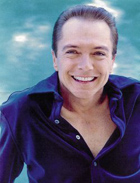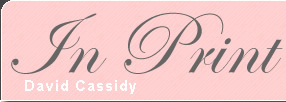
Thoroughbred Style Magazine
Star of Screen & Stage Continues To Makes His Mark In Thoroughbred Racing
May/June 2009 issue
By: Larry Simpson
Known to many as Keith Partridge of the 1970s TV show The Partridge Family, by the time he was 21, David Cassidy had become the highest-paid solo performer in the world and had a fan club larger than Elvis Presley's or the Beatles'. What followed were Broadway performances in Joseph and the Amazing Technicolor Dreamcoat and Blood Brothers, several television appearances, concert tours and worldwide record sales exceeding 35 million copies. During this time period as well, David also stamped himself as a significant owner and breeder of Thoroughbred racehorses, and is a regular visitor to the Saratoga race meet during the summer months.
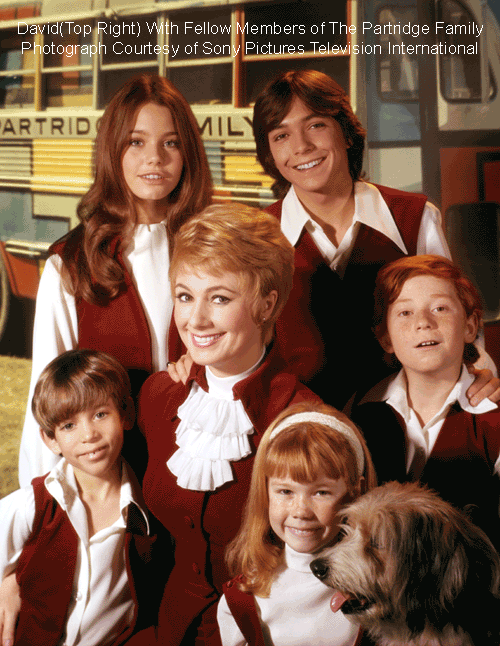
During a recent concert tour, ThoroughbredStyle had the opportunity to catch up with David Cassidy and the following interview about his career, and of course, his interest in horses transpired.
ThoroughbredStyle: David, as we speak you are in the midst of a concert tour and it has just been announced that you will be part of a new television series, Ruby and the Rockits, working with your brothers. Tell us a little about the show.
David Cassidy: Ruby and the Rockits is a comedy set to air this June on ABC Family channel. My brother Sean is the Executive Producer / Head Writer, and my brother Patrick and I are starring in it along with Alexa Vega who was in the movie Spy Kids. It's a half hour situation comedy with music, and lots of it. I think it is very funny, and we go into production the middle of April. Personally, I think it's the best work I've ever done. Patrick and Sean feel the same way. Actually, my other brother Ryan is going to be the set decorator. I guess you could say that it is totally a family affair, the first time all of us have worked together, which makes it very exciting.
TS: Can you give us a quick overview of the show?
DC: Patrick is a former teen idol who is living quietly with his wife and two sons. He and I were band mates in a group called Ruby and the Rockits, and I unexpectedly show up on his doorstep with my newfound teenage daughter in tow. Alexa Vega plays my daughter and I guess you could say that our family life from then on becomes anything but normal.
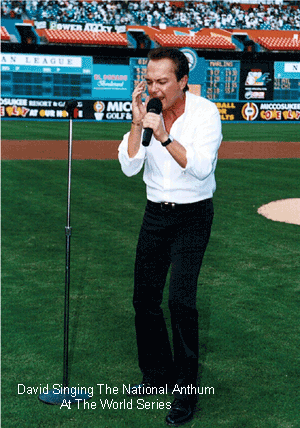
TS: You were obviously best known for your role in The Partridge Family, however there were other TV appearances between that show and Ruby and the Rockits
DC: I was actually nominated for an Emmy for a two hour Police Story, some years ago. I also did Man Undercover and Spirit of '76. But I mostly have worked in the theatre and in Las Vegas and of course my concerts.
TS: What attracted you to Thoroughbred Racing?
DC: I grew up around racing from the time I was about five. I was born and raised in New York City. When my parents divorced, I went to live with my grandparents (my mom's parents), about a half hour outside of New York. My Grandfather was a tremendous sports fan, a huge Yankees fan. He was also a big horse racing fan, and he took me to the racetrack for the first time when I was about 10. I was still living in New Jersey just outside of New York. He took me to Garden State Park, and then we took the train to Aqueduct the following year. I remember reading the sports section when I was nine or ten. Back then the horse racing coverage was far more extensive then it is now. I especially remember too the coverage given to a horse they called 'The Gray Ghost' who was the first horse, to my recollection, ever to be on TV. Even though he had just been retired, he was still very popular with racing fans. Actually, his real name was Native Dancer but everyone referred to him as 'The Gray Ghost'. It just so happens that he went on to become the broodmare sire of Northern Dancer who is probably the most important influence in Thoroughbred racing around the world, of the twentieth century. If you just consider Northern Dancer's offspring itself, and the fact that Native Dancer is the sire of premier sire, Raise a Native, who is the sire of Mr. Prospector, and as we mentioned the broodmare sire of Northern Dancer, you don't need to say any more if you know anything about Thoroughbred racing and breeding.
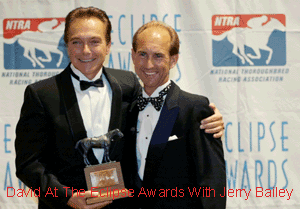
And that's the story. I grew up with the shows on television, My Friend Flicka, Hop Along Cassidy; you know the sweet and innocent stuff. I moved out to California with my mother in the early 60s. I think I was in the 5th grade, and my mother took me to Santa Anita, but I was already a big racing fan. I got my first riding horse when I was 15. He was stabled about 45 minutes away up a large hill and canyon, which I would have to ride my bike to get there. I would go riding after school. I have been an avid lover of horses and animals since then.
TS: What was life like as a teenager?
DC: I played guitar and drums and became very focused on becoming an actor. After I graduated from high school, two weeks after moving back to New York I got my first professional job with a Broadway show when I was 18. I then started getting acting jobs when I was 19, although I looked a lot younger, I got some leads in some of the popular dramatic shows that were on at that time. Shows like Mod Squad, Ironside, Marcus Welby, and Bonanza. Certainly, great shows for a young actor like myself to be playing leads in. I think I did nine or ten shows. And at the end of that year I got a pilot called The Family Business, which was then changed to The Partridge Family and it 'sold'. And once we started shooting the series. I was working every night, working all day long, and working weekends on a concert tour. And interestingly, our cameraman had a small ranch and had been breeding and racing Thoroughbreds. So he would bring in the 'Thoroughbred Record' and 'The Blood-Horse' to read. The 'Thoroughbred Record' is now 'Thoroughbred Times', and I still read them religiously today.
TS: So you could say that your horse racing interest had been rekindled?
DC: It never really went away. Just maybe put on hold while I focused on my acting career. You have to realize that the amount of information available on horse racing back then was quite limited and slow compared to what is available now. But anyway, I began reading the trades and then bought the 'Daily Racing Form' everyday, even though I didn't gamble and I have never really been much of a gambler at all. In fact I still continue to buy "the Form" now everyday, as I prefer the printed version rather then getting it online.
TS: The 'Daily Racing Form' is quite informative isn't it? Do you think it gives you an edge as a Thoroughbred breeder/owner?
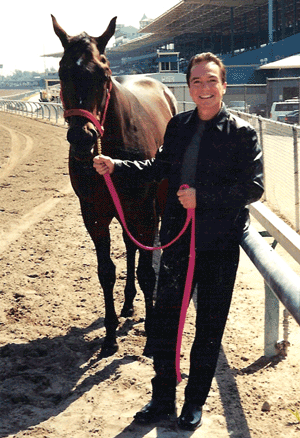
DC: It's a lot more informatative now then it used to be. I think it helps you stay current which I think as a breeder/owner you have to be. You especially need to be aware of the breeding market. It can change so dramatically within a couple of years. A stallion that is hot and commercially viable one year, in two years of your breeding program may be as cold as ice. I always relied on my 'gut' instinct and also what I believed was going to be best for my mare. I don't necessarily breed for the market although I'm very conscience of it and I have bred to some popular stallions. In 2008-2007, I was the number one breeder in New York, for average earnings per starter, percentage of stakes horses and stakes winners, for the second year in a row, which I'm really proud of. I bred three stakes horses, two stakes winners, and one graded stakes winner out of six foals.
TS: What is your breeding farm called?
DC: I don't have one. I don't own a farm. I did in the mid 1980s. I bought a farm in California that was previously owned by Harry Mangurian who moved to Florida and had a farm called Mockingbird.
TS: David, tell us a little about your breeding program then.
DC: I have had a couple of Canadian bred Thoroughbreds. I have one in training as I speak to you today; he's a two-year-old. I have a New York bred by a Canadian stallion by the name of Trajectory. She's just a yearling, and she is eligible to the Ontario Sires Stakes and a couple of the New York bred programs. I'm almost exclusively breeding and have been breeding in New York, although I do breed to stallions outside of the state. There's a good stallion now in New York though that I believe is going to be a really nice stallion called Read the Footnotes, and I have a mare that is a sister to three other graded stakes winners that is in foal to Pleasantly Perfect. She is currently at Gardiner Farms up in Ontario where she will foal then come back to Kentucky. With her we are taking advantage of the breeding bonuses available in New York, and in Ontario, where there is not a better bonus program in the world.
TS: The Canadian breeding and racing program is pretty good isn't it?
DC: It's not 'pretty good'; it's just the best! And I predict that it is going to get better. The purses are great at Woodbine. Actually, I have a bit of a soft spot for Woodbine as three years ago I shipped one of my New York bred fillies up there and won a stakes, beating the champion older mare whose name has slipped my mind right now.
I spend quite a lot of time at my friend Dr. Jerry Bilinski's Waldorf Farm in New York. In fact, I keep my mares that are in New York there. When their foals are weaned they are sent to Florida, and I spend quite a bit of time near Ocala, where my 'babies' are brought up and broken. Some go on to various sales or I may hold on to them, although I don't race that many. I have to, for economic reasons, sell most of them. So some may sell at Saratoga or Fasig Tipton in Kentucky.
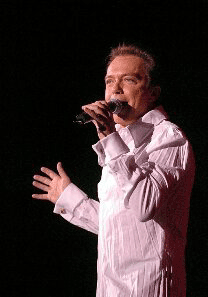
TS: So at last count how many horses do you have?
DC: Combined, with mares and foals, yearlings and two-year-olds, 30. I probably own about 15 of them myself. But I like the idea of having the 'right' partner. I had one really bad experience with a partner. It just didn't work out. (laughs)-His dream and objective was that he had to win the Kentucky Derby every year. Some people just have an unrealistic expectation. But I've had a lot of successful partnerships, but in some cases racing winners, or stakes winners just isn't enough. People don't understand the risk and reward. It's not just about making money. For me it's a passion, something that I love, and I have been very fortunate to be able to do it.
TS: What are some of your philosophies for breeding?
DC: They say you should never fall in love (with horses) and occasionally I have. It is hard to put into words, the love I have for horses. I think I'm proud of what I have done as a breeder. In the past, I had to sell horses that I knew were far more valuable, but I couldn't afford to hold on to them. You have to sell when the time is right. I made the mistake a couple of times of not selling and then regretting it later. But, everybody makes mistakes and I've made more then my share, but virtually I guess I have done enough 'right' that I have been able to stay in the business on my own terms. I can't afford to breed to horses that have stud fees that are so high that if you don't get a great foal, you are going to lose money. If you have eight mares, and you put $250,000 into one stud fee and you get a bad foal, it just doesn't make economic sense, especially when there are stallions out there with stud fees of $25,000 or less that you can make a reasonable profit with. I like the idea of doing it on my own though, and I don't say this egotistically. I like using my extended knowledge and the research I did over the past 35 years, to my advantage. Studying what has worked consistently.
TS: Is it safe to say it's still your goal to either breed a Kentucky Derby winner or to race a horse in the Derby?
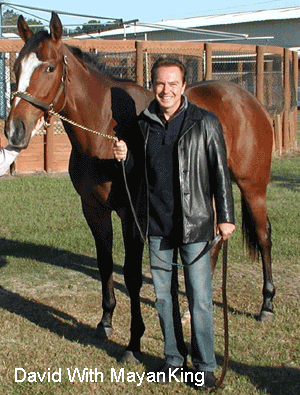
DC: Yes, definitely. It's probably any serious horsemen's dream. I would say though that most of the horses that I breed, are bred obviously with an awareness of the commercial market while at the same time with the hopes of breeding a classic racehorse. With what has happened in the last decade, we have created what I think is a 'bad mess', of breeding for early speed. Four, four and a half and five furlong races early in the season, which is all fine and dandy in May of their two-year-old year, but how many of these horses are going to be around in May of their three-year-old season? We unfortunately breed for speed, speed, and more speed! We breed unsoundness! We breed horses with distance limitations, and we breed what sells! I sell a good percentage of my horses in the two-year-old sales. I sell no earlier than March; I have one in the April sale, sorry two in April, and three in May this year.
TS: Recently, as you know, I interviewed Bo Derek who had just been named as a Commissioner to the California Horse Racing Board.
DC: She and John Derek used to live about two miles away from farm that I mentioned earlier that I had had in the 80s.
TS: So like Bo Derek, have you got aspirations to maybe someday get into the regulatory side of racing?
DC: I was keynote speaker three years ago at the Thoroughbred National Museum in Saratoga for the Hall of Fame, and part of my speech, was about how we need to bear in mind that the integrity of any sport is essential to its survival, its growth, its development and its awareness. And being an animal lover, and being supportive of the animal rights, I have a tremendous concern about what is going on in other sports (steroids). There are always going to be people that want to cheat, and do it at the expense of everyone else in the sport.
TS: You seem to be quite an ambassador for Canada, specially its Thoroughbred-racing product?
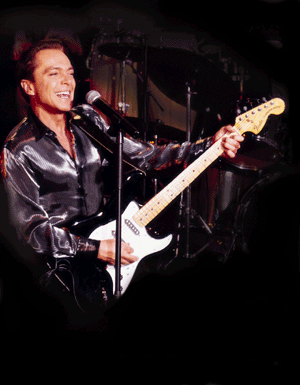
DC: You know, it is my belief that if the weather in Canada was like that of California, everybody would live there. It's a fantastic country! I have a couple of good friends who live in Ontario and once or twice a year I will go up to visit them and take in the races. Plus I usually perform in parts of Canada regularly throughout the year as well. It has been a great long-term relationship for me with Canada.
I only hope that at some point down the road that I would be able to be more involved with breeding in Ontario. The quality of racing is so high, like New York. Basically, I believe that every champion in every division needs to show itself in New York (Belmont, Saratoga), or in Canada at Woodbine.
TS:If it was possible, and you could be named the Racing Commissioner or 'Racing Czar' for all of horse racing, what would be the first thing on your agenda to improve the racing product?
DC: I've toured all over the world and I have seen racing at the highest levels. I attended the Melbourne Cup, I have been to the Irish Derby and the Epsom Derby and I have attended racing at the highest level in New Zealand, where it is an entertainment event. I would make racing and our tracks, multi- entertainment facilities that are child- friendly and don't necessarily accentuate the gambling side, while at the same time, giving people some education about the horse, and racing in general. Actually, I think what I would consider doing first, would be to call John Ferguson (Sheikh Mohammed's bloodstock manager), who I consider to be a good friend, a great guy, and a great horse racing mind. I would have John consult, and spearhead, especially if money was not an issue, a program that would take certain parts of what they do in Ireland, the UK, France, New Zealand, Australia and Japan and combine the best from each, and make racetrack ' events' out of them. Especially on weekends. Make these events more fan friendly and I think I would do much more advertising and marketing that educate what horse racing is all about.
TS: In other words, try to interest a younger generation?
DC: To some degree. Unfortunately though, there are so many of the younger generation now, who have a limited disposable income, and their entertainment income is also very limited. Therefore, you have to make the racing product, very fan friendly and appealing. In other words, where else can you go for 20 bucks, and have a chance to not only win a lot of money but also involve them in something that is really entertaining with great food and fantastic atmosphere? And bring in the young 'stars' in all fields of entertainment, meaning, invite the stars from NASCAR, movie stars, music stars, or television stars to a day at the races. What young people want, is to feel like they are part of something that is attractive and cool! That's what racing used to be like in the 30s 40s and 50s. It's what Hollywood Park and Santa Anita were all about. There were movie stars there! The same at Del Mar. Sure, Bing (Crosby) was the 'face' of it, but Jimmy Durante was part of that era, and the track goers wanted to be around 'those people'. From marketing stand point it only makes sense.
TS: So what part of racing do you think 'dropped the ball'?
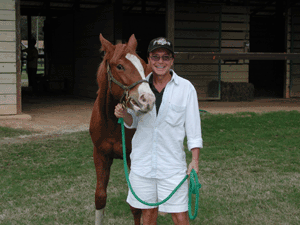
DC: I think it has been 'baking in the oven' for a long, long time. The infighting within the industry didn't help, nor did the arrogance. The racetrack was the only place where people could legally gamble besides Las Vegas, and I'm talking decades ago. And when other sports marketed themselves such as the NFL, the NBA, Major League Baseball, Thoroughbred racing was just very short sighted. They are controlled by a lot of people who are not necessarily in touch with the public. Extraordinarily wealthy, elitists perhaps, but also there were the infighting between tracks and associations, as opposed to a 'lets all do this together' attitude. The AFL merged with the NFL and they had this event called the Super Bowl, which in its first few years was probably undistinguished until 'Broadway' Joe Namath made the 'pitch' and ran with it. Instead of trying to bury the AFL, which I am sure the NFL tried in the beginning, they merged and came up with a better product. Racing too did finally realize that instead of trying to kill each other or fight each other, lets get together and come up with something better, which they called the NTRA. I think that's an essential part of what was missing 30 years ago, and I believe that it came from such a long standing arrogance that people are going to come to the track, because 'we are the only game in town'. You know, there are 600 Indian Casinos in North America and I have 'played' most of them. So all of that changed, people just didn't go to the track anymore! And a separate problem was the lack of exposure for racing on television. That's where racing really fell down! Now it is time to face the music. Sure attendance is down, but it is down everywhere, in everything. So you have to offer something else. There is a way to approach it that has to be completely and totally transparent, and everybody involved has to be on the same page, that your survival depends on my survival.
TS: What do you prefer more, acting or performing?
DC: I love to do all of it. Even as a writer, producer, and songwriter. I love to entertain people. I love to play live. If you gave me a choice to do anything I probably would say, give me a microphone, give me my guitar and my band, and let me go out and spend an evening with people and just take them on a little musical journey, which is what I'm going to continue to do.
TS: It all started with The Partridge Family show correct?
DC: It did for me as a recording artist. As I said, I had already been on Broadway, I had done 'families' and dramatic shows, but the rest of my career has been launched in an enormous way from The Partridge Family, all over the world. I have been blessed to have a lot of fans that have stayed with me over the years and many new ones that have come to see the work I've been doing the last several decades.
TS: Do you ever see any members of The Partridge Family?
DC: Shirley (Jones) is the only one I see. I love Shirley, she's obviously my step mom, but she's my brothers' mom and she's a legend, one of the nicest most genuine talented people I have ever met or worked with.
TS: What's your favourite place to play?
DC: I can't really say there is one place I prefer, as I am fortunate to have the kind of fan base that is so remarkably supportive and enthusiastic. I did over 2000 shows in Las Vegas. I love the UK, Australia, New Zealand and I love performing in Canada. The Canadian fans are just fantastic!
TS: Would you say John Lennon was the most influential person in your career?
DC: Very, I'd say John was by far the most important. It was so important to know John, as well, and play with him, or just hang out with him and Yoko. I have such great respect for him as a human being. I think the world is a worse place now without him. I think he especially influenced all of us through the lyrics, 'all we are saying is give peace a chance'. Look how the world has evolved since he wrote that. The world was certainly a kinder gentler place, with his influence in it. And that being said, he was my friend. I learnt to play guitar after I saw the Beatle's on Ed Sullivan, and like many other boys at that time, I went out and bought an electric guitar, which eventually enabled me to play with some of the greatest musicians that ever lived.
TS: Do you think there are any similarities between horse racing and the entertainment industry?
DC: Yes, they are completely and totally unpredictable. You never know when lightening can strike and then you can go dormant, meaning without work. There is nothing consistent about either. You learn to expect their inconsistencies!
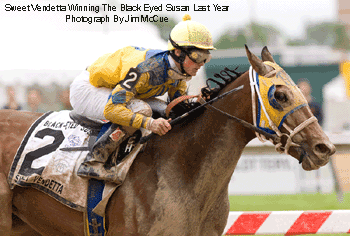
Rapid Fire Questions with David Cassidy
Greatest horse you ever saw? Secretariat
Greatest Kentucky Derby ever witnessed? Alydar and Affirmed (1978)
Greatest jockey ever? Angel Cordero Jr.
Favourite song or performer? John Lennon
Last movie you saw? Slum Dog Millionaire
Favourite drink? Diet Pepsi Favourite Restaurant? Don't have one!
Favourite racetrack? Saratoga
Favourite racetrack celebrity? Bill Parcells
Favourite sports team - UCLA Bruins (basketball)
Greatest racetrack moment? When Sweet Vendetta (a filly that I bred and I co-own) won the Black Eyed Susan Stakes the day before the Preakness last year!
